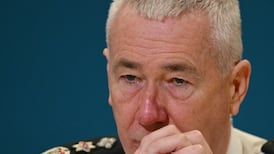Before taking over from Enda Kenny as leader of the country, Leo Varadkar effectively began the final move against then Garda commissioner Martin Callinan.
In March 2014, Varadkar urged Callinan to withdraw his labelling of the actions of Garda whistleblowers as “disgusting”, saying they had acted in a “distinguished” manner.
It put Callinan on the ropes and he would never get off them.
Five days after his rebuke at the hands of Varadkar, Callinan resigned amid revelations phone calls to Garda stations had been secretly recorded for years.
Last Friday Varadkar was rebuking the Garda again. This time it was the turn of the Garda Representative Association.
In controversial remarks, the GRA had said there was no evidence its members were involved in the inflating of breath-test data.
The GRA, which represents more than 10,000 rank-and-file gardaí in a force of about 13,000, said management was to blame and that its members would not accept any of the blame.
GRA spokesman John O'Keeffe later went further. "GRA members did not falsify figures," he told RTÉ. "[They] were told to elevate figures by middle and senior management, and those figures were elevated thus."
Varadkar expressed his disappointment. He bemoaned the GRA’s apparent rejection of the findings of Assistant Commissioner Michael O’Sullivan, whose report on the breath-testing debacle was published two weeks ago.
The Taoiseach said it was troubling that not enough gardaí had bought into the need for reform.
Making up figures
It is hard to concur with the GRA when it says none of its members did anything wrong, when the O’Sullivan report clearly details examples of some rank-and-file gardaí simply making up testing figures.
That said, what Varadkar has overlooked is that the kernel of what the GRA is claiming is largely supported by Michael O’Sullivan’s report.
The GRA told the O’Sullivan process that a range of issues conspired to ensure inaccurate and inflated data was compiled, such as a lack of training and poor supervision.
But it said there was also “an unhealthy enthusiasm to provide statistics to support and purport management’s success”.
The GRA added “unrealistic and impossible targets and timelines” were set by chief superintendents. At the same time “zero was not an acceptable statistic” to management.
The Association of Garda Sergeants and Inspectors largely agreed.
Like the GRA, it cited staff shortages and a lack of training as contributory factors. But it also very firmly supported the GRA’s contention that senior management put in place unrealistic targets.
“There was a requirement from some Garda managers to show increases in detections month on month, year on year,” the O’Sullivan report says of the AGSI’s position.
“It was believed that managers used increased enforcement levels at a time of reducing resources to improve their promotion profile. To satisfy Garda management demands and avoid conflict, members reported they felt pressured to inflate numbers.
“It was feared that if units didn’t reach targets they could be redeployed from temporary roles. No one ever asked how targets were achieved but they asked how targets were not achieved.”
Higher up the chain, the Association of Garda Superintendents was least generous of the staff bodies in sharing information with O’Sullivan.
But even it pointed to an unrealistic expectation when it came to breath-testing targets.
It said nobody in the Garda ever considered whether the force had the capacity, at a time of falling staff numbers, to carry out breath tests.
Even further up the chain of command, the Association of Garda Chief Superintendents pointed to the possible source of the pressure for bigger enforcement numbers the GRA and AGSI said its members were subjected to.
O’Sullivan’s report summarised some of the evidence of the chiefs’ association thus: “Chief superintendents were not put under any direct pressure to increase the number of [alcohol and intoxicant] checkpoints.
“However, there was comparison and scrutiny of the number of divisional [alcohol and intoxicant] checkpoint numbers at Regional performance and accountability framework meetings, and by way of yearly comparison.”
Reasons for inflation
In another section of his report, Assistant Commissioner O’Sullivan dedicates a section to the “reasons Garda members inflated breath tests”.
Firstly, he says, gardaí may not have been accurately recording activity at breath-testing checkpoints as they unfolded. And so when it later came to creating the official record of the checkpoint, they estimated.
Secondly, O’Sullivan points to – as the GRA argues – the “overambitious scheduling” of checkpoints by Garda management locally.
He concludes that this was “a factor in some Garda members inflating breath test figures”.
He writes: “By scheduling excessive amounts of checkpoints, managers were putting pressure on members to do them.
"It has also been suggested that members of An Garda Síochána felt that they were expected to increase the number of checkpoints/breath tests by whatever means possible, and this may have led to the deliberate inflation of breath tests."













